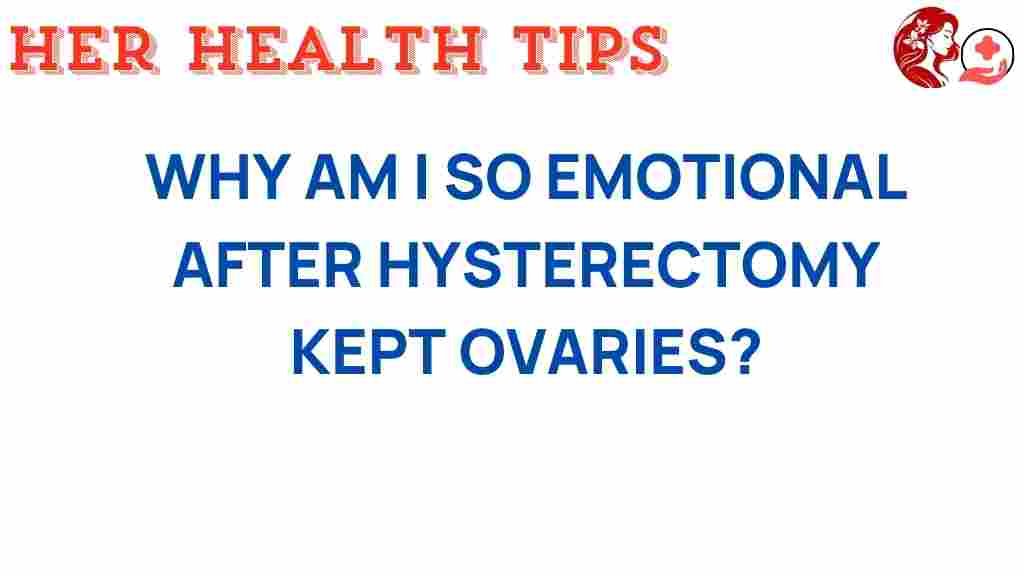Understanding Post-Hysterectomy Emotions: What You Need to Know
Undergoing a hysterectomy is a significant life change for many women, affecting not only their physical health but also their emotional well-being. As the uterus is removed, often along with the ovaries, the hormonal balance in a woman’s body can be dramatically altered, leading to various emotional and psychological responses. In this article, we will delve into the emotional health aspects of post-hysterectomy recovery, exploring the impacts on mental wellness, the importance of emotional support, and practical tips for managing this transition.
The Emotional Journey After Hysterectomy
After a hysterectomy, many women experience a wide range of emotions. It’s important to acknowledge that these feelings are perfectly normal and are part of the recovery process. Here are some common emotional responses:
- Relief: Many women feel relieved if the surgery was done to alleviate pain or other health concerns.
- Sadness: It’s normal to feel sad about the loss of the ability to have children.
- Anxiety: Concerns about physical changes and health can cause anxiety.
- Anger: Some women may feel anger about their situation or the necessity of the surgery.
- Confusion: Changes in hormonal levels can result in mood swings and feelings of confusion.
Understanding Hormonal Changes
One of the most significant impacts of a hysterectomy is the change in hormone levels, especially if the ovaries are removed during the procedure. The ovaries produce hormones crucial for emotional and physical health, including estrogen and progesterone. Here’s how hormonal changes can affect emotional health:
- Estrogen Deficiency: A decrease in estrogen can lead to mood swings, depression, and anxiety.
- Physical Symptoms: Hot flashes, night sweats, and fatigue can also contribute to emotional distress.
- Body Image: Changes in weight or body shape can affect self-esteem and mental wellness.
Steps to Support Emotional Health Post-Hysterectomy
Supporting your emotional health after a hysterectomy involves a holistic approach. Here are some actionable steps you can take:
1. Seek Professional Help
Consider speaking with a mental health professional who specializes in women’s health. Therapy can provide a safe space to navigate your emotions and develop coping strategies.
2. Join a Support Group
Connecting with other women who have undergone similar experiences can provide emotional support. Look for local or online support groups focused on women’s health and hysterectomy recovery.
3. Educate Yourself
Understanding the changes your body is going through can alleviate fears and anxieties. Read books, articles, or attend workshops related to post-hysterectomy recovery.
4. Prioritize Physical Health
Physical health is closely linked to emotional well-being. Engage in regular physical activity, eat a balanced diet, and stay hydrated to help combat emotional fluctuations.
5. Practice Mindfulness and Relaxation Techniques
Incorporate mindfulness practices such as yoga, meditation, or deep-breathing exercises into your daily routine. These techniques can help manage stress and promote mental wellness.
Recovery from a hysterectomy varies from woman to woman, but understanding the typical timeline can help you set realistic expectations:
- Immediate Post-Operative Phase: Expect some discomfort and fatigue. Emotional reactions can be intense during this time.
- First Few Weeks: As your body heals, you may notice some emotional fluctuations. This period requires patience and self-care.
- 1-3 Months Post-Surgery: Many women start feeling more like themselves, but hormonal adjustments may still cause mood swings.
- 3-6 Months Post-Surgery: Emotional stability often improves as the body adjusts to new hormonal levels. Regular check-ups with your healthcare provider are crucial during this time.
Troubleshooting Emotional Challenges
Despite best efforts, some women may face ongoing emotional challenges post-hysterectomy. Here are some troubleshooting tips:
1. Monitor Your Symptoms
Keep track of your emotional and physical symptoms. This record can be helpful for discussions with your healthcare provider.
2. Explore Hormone Replacement Therapy (HRT)
If you experience severe emotional distress, discuss the possibility of hormonal changes with your doctor. HRT may help alleviate some emotional symptoms.
3. Stay Connected
Maintain connections with friends and family. Social support is vital for emotional health, and sharing your feelings can lighten the burden.
4. Engage in Creative Outlets
Art, writing, or other creative activities can provide an emotional release and a way to express feelings.
5. Set Realistic Goals
Focus on small, achievable goals to foster a sense of accomplishment. This can improve motivation and emotional health.
Conclusion: Embracing Your New Normal
Understanding the emotional health implications of a hysterectomy is crucial for recovery. The journey involves navigating hormonal changes, embracing emotional support, and prioritizing both mental and physical health. Remember, it’s essential to give yourself grace during this period of adjustment.
As you move forward, consider reaching out for professional assistance if needed, and don’t hesitate to lean on your support network. With time, patience, and the right resources, many women find their emotional wellness improves significantly. Remember, you are not alone in this journey. For more information on managing emotional health after surgery, visit this resource.
For further reading on women’s health and emotional wellness, check out this guide.
This article is in the category Reproductive and created by HerHealthTips Team
